Click on images to enlarge
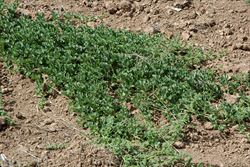
habit (Photo: Rob and Fiona Richardson)
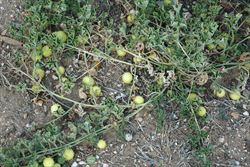
habit in fruit (Photo: Rob and Fiona Richardson)
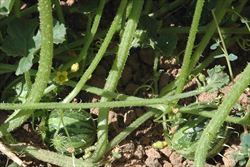
roughly hairy stems (Photo: Rob and Fiona Richardson)
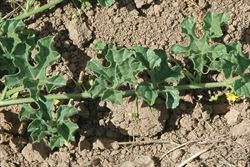
deeply-lobed leaves (Photo: Rob and Fiona Richardson)
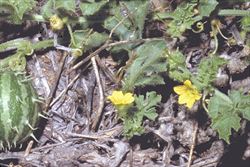
tendrils, leaf undersides and flowers (Photo: Dave Albrecht)
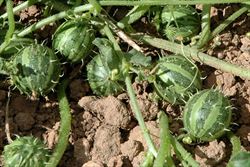
immature fruit (Photo: Rob and Fiona Richardson)

mature fruit (Photo: Sheldon Navie)

close-up of seeds (Photo: Steve Hurst at USDA PLANTS Database)
Scientific Name
Cucumis myriocarpus Naudin
Synonyms
Cucumis myriocarpus Naudin subsp. leptodermis (Schweick.) C. Jeffrey & P. HallidayCucumis myriocarpus Naudin subsp. myriocarpus
Family
Cucurbitaceae
Common Names
gooseberry cucumber, gooseberry gourd, paddy melon, prickly paddy melon, prickly paddymelon
Origin
Native to southern Africa (i.e. Mozambique, Zambia, Botswana, Lesotho and South Africa).
Naturalised Distribution
This species is very widely naturalised in Australia, particularly in inland and southern regions. It is common and relatively widespread in Queensland, New South Wales, the ACT, Victoria, Tasmania and South Australia. It is also common in the southern and central regions of Western Australia and the southern and eastern parts of the Northern Territory.
Notes
This vine is regarded as an environmental weed in Victoria, Queensland, South Australia, Western Australia and the Northern Territory. It is mainly seen as a weed of disturbed sites, roadsides and agricultural areas (i.e. pastures and crops), however it is also widespread in rangelands and natural communities (e.g. grasslands and open woodlands).
In the Northern Territory, prickly paddymelon (Cucumis myriocarpus) has been recorded as a weed of arid wetlands. It has also been recorded from conservation areas in South Australia (e.g. Hallett Cove Conservation Park, Coorong National Park, Onkaparinga River National Park and Flinders Ranges National Park), Victoria (e.g. Organ Pipes National Park and Dookie Bushland Reserve) and New South Wales (e.g. Five Islands Nature Reserve).

